"The U.S. economy, I think, will weather this disaster. We will see improvement in growth as we go in to 2006. The main concern I have is actually for inflation. I'm not concerned it will have this massive break out but prices are clearly being pressured higher right now."
Thomas Hoenig
President of the Kansas City Fed.
Thursday, October 6, 2005 08:44 GMT
Zig Zag Week
The US economy is up. The US economy is down. Take you pick. On Monday ISM Manufacturing printed 59.4 against expectations of 52, but by Wednesday the ISM Non Manufacturing survey reversed the momentum by printing a much lower 53.3 vs. 60 expected. Given the fact that services now make up 80% of US economy, the market was properly spooked and the dollar went into 200 point tail spin against the euro by midweek. Finally Friday's NFP came in much better -35K against -150K projected as post Katrina effect seemed to be far less destructive than feared. But as we noted in our post NFP note, “The EUR/USD dropped about 40 points in the aftermath of the release but recovered some of the loss, reflecting the market's uncertainty about the veracity of the figures.”
Where does all of this leave us? Most likely in the same grinding range we have been in for the past three months. At 1.2000 EUR/USD looks to be a buy at 1.2400 it's a sell. Until the market finds a new theme that appears to be most likely scenario.
The front of the week is absolutely empty and we will have to wait until Thursday's Trade Balance and Fridays Retail Sakes to see if further greenback weakness is due.
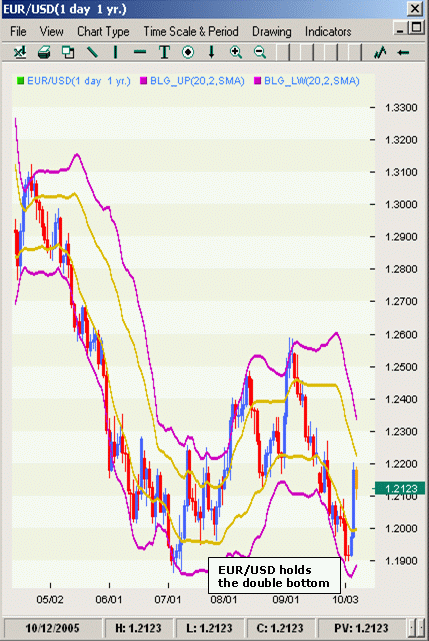
"There will be no decision until Sunday on whether she or Chancellor Gerhard Schroeder of the Social Democrats (SPD) will lead the next government."
Angela Merkel
Leader of the Opposition Christian Democrats (CDU)
Thursday, October 6, 2005 15:19 GMT
No Bad News is Good News
The euro gained 80 basis points against the greenback this week as a result of both mildly better than expected eco data from the Euro-zone and somewhat disappointing news from US. The lower euro continued to help both manufacturing and service industries in the Euro-zone as both indexes rose above expectations with manufacturing registering 51.7 and services 54.7. Both indexes are above the 50 boom/bust level, but the European recovery is achingly slow with Consumer demand stymied by high oil prices.
The euro also got a bounce this week from murmurings about a possible ECB rate hike. But the Central Bank left the rate unchanged at 2.0% and Trichet was coy about his true intentions. Frankly the ECB cannot tighten until Europe's demand and most importantly employment, picks up. However, a few more positive PMI releases and the rate hikes will most definitely become a reality - something that should be bullish for the euro.
Meantime the market will focus on the resolution of the German elections and the smattering of economic data including the Current Account and the CPI news from Germany.
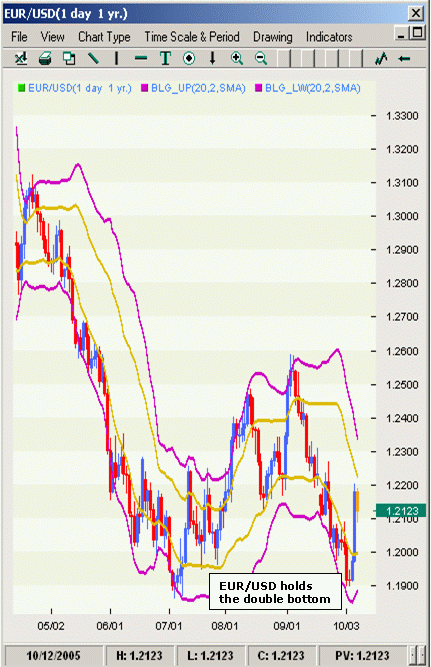
"The Bank of Japan sees the possibility of lifting the four-and-half-year long super-loose monetary policy in early 2006, although it will not be rushed into any hasty change."
Hidehiko Haru
BoJ Policy Board Member
Tuesday, October 4, 2005 09:41 GMT
High Oil Low Yen
The yen remained the one of the weaker majors of the week dropping 22 basis points against the dollar. The story with the yen can be summarized in a few words - high oil, low yen. As long as oil stays above the $60 handle the yen will remain under pressure.
Last week USD/JPY clearly ran into resistance at the 114.00 figure, but if oil continues to trade at near record levels it may well try to retest those highs, as not only the input cost worries, but the carry trade momentum will keep the pair elevated. Having said that, the yen is clearly oversold and is far nearer to some short term bottom. Therefore, the risks of further USD/JPY longs are probably greater than the rewards at this point in time.
Next week the Eco Watchers survey will once again provide the true pulse of the Japanese economy and Industrial Production will reveal the extent of the damage to nations manufacturing sector from relentlessly high oil prices.
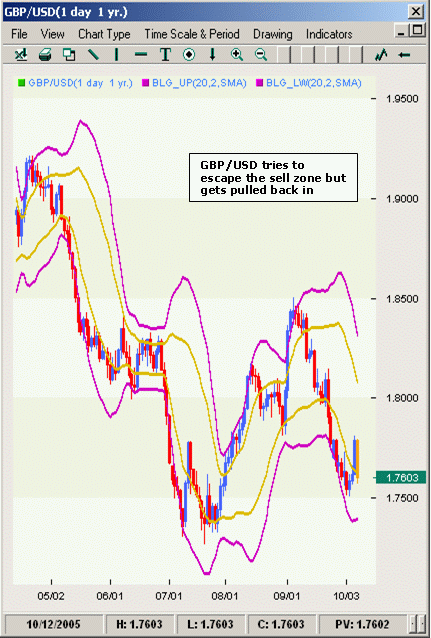
"The BRC is disappointed the Monetary Policy Committee did not make a further reduction to interest rates today. The weak consumer sentiment does not appear to be subsiding and so the MPC's decision does not reflect the reality on the high street. A further cut between now and Christmas is necessary if we are to see any positive change in the retail climate."
Kevin Hawkins
BRC Director General
Thursday, October 6, 2005 15:18 GMT
BRC vs. the BOE
The pound hobbled its way to the worst performance of the week against the greenback dropping 23 basis points. How bad is the UK economy faring? According to the stiff upper lipped BOE, not so bad at all. But the message from the British Retail Consortium is far different as we can see from the quote above.
The BOE left the rates unchanged this week on the belief that the tiny 25 basis point cut the last time was enough stimulation for the economy. The data does not seem to concur. Industrial Production and Manufacturing Production both plunged -0.9% and -1.95 respectively indicating that the slowdown is far more sever than cable bulls may believe.
Eventually the BOE will have to face reality and lower rates which ultimately bodes badly for the pound. However this week positive results unemployment and Trade Balance numbers may just provide the much needed boost to cable bulls.
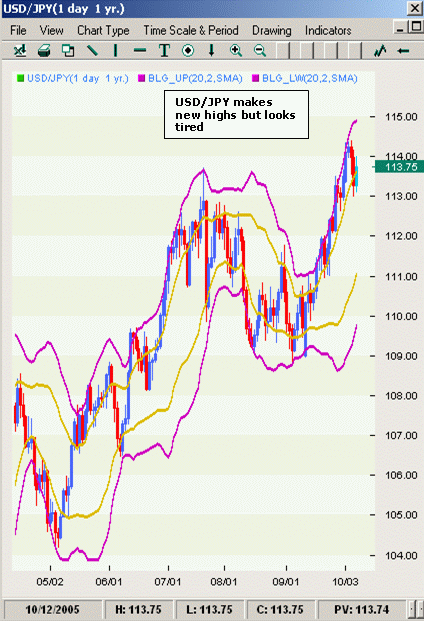
Swiss Strength!
Finally the Swissie rallies restoring our faith in fundamental analysis! As you may recall we have been bullish on the Swiss fundamentals for three weeks running as the unit continued to lose ground against not only the greenback but all other major as well. This week the franc longs finally received their just due as the single currency gained against the dollar, euro and the pound.
If dollar weakness persists through next week, Swissie should continue to gain momentum, but having captured 100 points against the euro and nearly 400 points against the pound a pause may be in the offing.
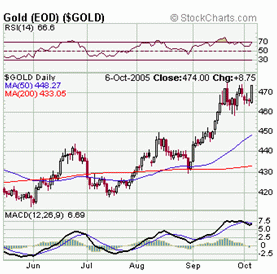
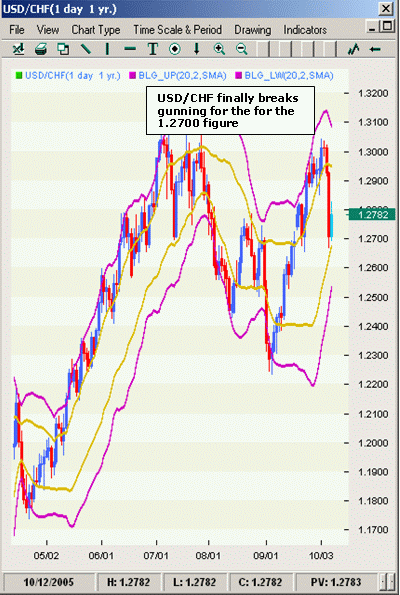
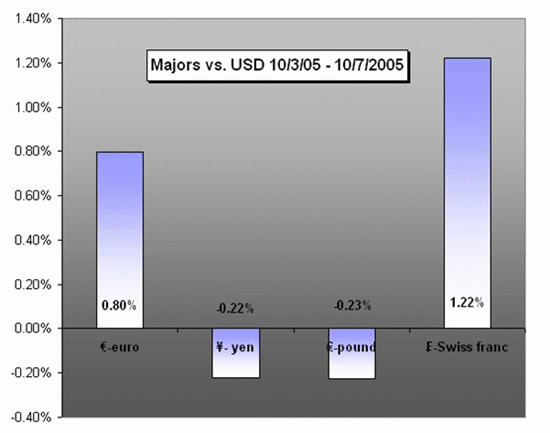
Boris Schlossberg is a Senior Currency Strategist at FXCM.